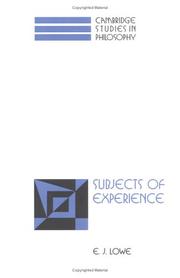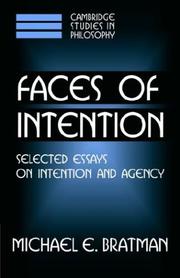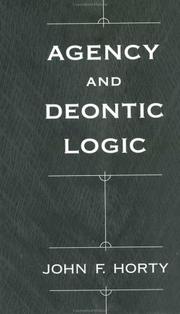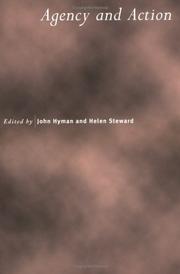Book
ISBN: 9780199694853 9780199694860 Year: 2013 Publisher: Oxford Oxford university press
Abstract | Keywords | Export | Availability | Bookmark
 Loading...
Loading...Choose an application
- Reference Manager
- EndNote
- RefWorks (Direct export to RefWorks)
Responsabilité. --- Agent (philosophie) --- Acte (métaphysique) --- Théorie de l'action. --- Philosophie de l'action. --- Responsibility. --- Agent (Philosophy) --- Act (Philosophy)
Book
Year: 1968 Publisher: [Toronto] : University of Toronto Press,
Abstract | Keywords | Export | Availability | Bookmark
 Loading...
Loading...Choose an application
- Reference Manager
- EndNote
- RefWorks (Direct export to RefWorks)
Act (Philosophy) --- Agent (Philosophy) --- Philosophical anthropology --- Mind and body --- Action (Philosophie) --- Agent (Philosophie) --- Anthropologie philosophique --- Esprit et corps

ISBN: 0521475031 0521031559 0511598009 Year: 1996 Publisher: Cambridge Cambridge University Press
Abstract | Keywords | Export | Availability | Bookmark
 Loading...
Loading...Choose an application
- Reference Manager
- EndNote
- RefWorks (Direct export to RefWorks)
In this innovative study of the relationship between persons and their bodies, E. J. Lowe demonstrates the inadequacy of physicalism, even in its mildest, non-reductionist guises, as a basis for a scientifically and philosophically acceptable account of human beings as subjects of experience, thought and action. He defends a substantival theory of the self as an enduring and irreducible entity - a theory which is unashamedly committed to a distinctly non-Cartesian dualism of self and body. Taking up the physicalist challenge to any robust form of psychophysical interactionism, he shows how an attribution of independent causal powers to the mental states of human subjects is perfectly consistent with a thoroughly naturalistic world view. He concludes his study by examining in detail the role which conscious mental states play in the human subject's exercise of its most central capacities for perception, action, thought and self-knowledge.
Philosophical anthropology --- Agent (Philosophy) --- Self (Philosophy) --- Subject (Philosophy) --- Agent (Philosophie) --- Moi (Philosophie) --- Sujet (Philosophie) --- Philosophy --- Agency (Philosophy) --- Agents --- Person (Philosophy) --- Act (Philosophy) --- Arts and Humanities

ISBN: 0521637279 0521631319 0511625197 9780521637275 9780521631310 9780511625190 Year: 1999 Publisher: Cambridge Cambridge University press
Abstract | Keywords | Export | Availability | Bookmark
 Loading...
Loading...Choose an application
- Reference Manager
- EndNote
- RefWorks (Direct export to RefWorks)
This collection of essays by one of the most prominent and internationally respected philosophers of action theory is concerned with deepening our understanding of the notion of intention. In Bratman's view, when we settle on a plan for action we are committing ourselves to future conduct in ways that help support important forms of coordination and organization both within the life of the agent and interpersonally. These essays enrich that account of commitment involved in intending, and explore its implications for our understanding of temptation and self-control, shared intention and shared cooperative activity, and moral responsibility. The essays offer extensive discussions of related views by, among others, Donald Davidson, Hector-Neri Castañeda, Christine Korsgaard, Harry Frankfurt, and P. F. Strawson. This collection will be a valuable resource for a wide range of philosophers and their students.
Agent (Philosophy). --- Intentionality (Philosophy). --- Intentionnalité (Philosophie) --- Intentionality (Philosophy) --- Agent (Philosophy) --- Agent (Philosophie) --- Agency (Philosophy) --- Agents --- Person (Philosophy) --- Act (Philosophy) --- Mind and body --- Philosophy --- Arts and Humanities
Book
ISBN: 9780199592500 9780199217144 0199592500 0199217149 1281852562 9786611852566 0191550906 0191712418 Year: 2010 Publisher: Oxford Oxford University Press
Abstract | Keywords | Export | Availability | Bookmark
 Loading...
Loading...Choose an application
- Reference Manager
- EndNote
- RefWorks (Direct export to RefWorks)
E.J. Lowe defends a common-sense view of ourselves as free agents, capable of bringing about changes in the world through the choices we make, rather than being caused to act as we do by factors external to our will.
Philosophical anthropology --- Metaphysics --- Choix (Psychologie) --- Agent (Philosophy). --- Choice (Psychology). --- Free will and determinism. --- Agent (Philosophy) --- Choice (Psychology) --- Agent (Philosophie) --- Libre arbitre et déterminisme
Book
Year: 1971 Publisher: Paris : Mouton,
Abstract | Keywords | Export | Availability | Bookmark
 Loading...
Loading...Choose an application
- Reference Manager
- EndNote
- RefWorks (Direct export to RefWorks)
Personality --- Psychology, Religious --- Personalism --- Agent (Philosophy) --- Individuality --- Individuation (Philosophy) --- Personnalité --- Psychologie religieuse --- Personnalisme --- Agent (Philosophie) --- Individualité --- Individu (Philosophie) --- Religious aspects --- Christianity --- Philosophy --- Aspect religieux --- Eglise catholique --- Philosophie
Book
ISBN: 9780199225989 Year: 2009 Publisher: Oxford ; New York : Oxford University Press,
Abstract | Keywords | Export | Availability | Bookmark
 Loading...
Loading...Choose an application
- Reference Manager
- EndNote
- RefWorks (Direct export to RefWorks)
Philosophie de l'action. --- Agent (philosophie) --- Esprit. --- Philosophie de l'esprit. --- Conscience. --- Conscience morale --- Responsabilité. --- Jugement moral. --- Act (Philosophy) --- Agent (Philosophy)

ISBN: 0195134613 9780195134612 0199833265 0195391985 9786610473212 0198030762 1280473215 1423727517 Year: 2001 Publisher: Oxford Oxford University Press
Abstract | Keywords | Export | Availability | Bookmark
 Loading...
Loading...Choose an application
- Reference Manager
- EndNote
- RefWorks (Direct export to RefWorks)
Mathematical logic --- Deontic logic. --- Agent (Philosophy) --- Logique déontique --- Agent (Philosophie) --- Deontic logic --- Agency (Philosophy) --- Agents --- Person (Philosophy) --- Act (Philosophy) --- Philosophy --- Logic, Deontic --- Duty --- Modality (Logic) --- Agent (Philosophy). --- Logique déontique --- Philosophie --- Logique
Book
ISSN: 07680708 ISBN: 9782130562696 2130562698 Year: 2007 Publisher: Paris Presses universitaires de France
Abstract | Keywords | Export | Availability | Bookmark
 Loading...
Loading...Choose an application
- Reference Manager
- EndNote
- RefWorks (Direct export to RefWorks)
Aujourd'hui le sens de " la distinction ", fondatrice de l'humanité, entre chose et personne est devenu obscur : jamais le terme de personne n'a été autant utilisé, revendiqué, et jamais le mot n'a été aussi vide. Il y a donc une urgence à rendre au terme de personne la dignité d'un concept, ou au moins d'en faire le lieu d'une controverse, au-delà de tous les consensus anesthésiants. Contre un tel oubli de la personne, il s'agit de lier une méthode historique, qui donne à voir la généalogie du concept de personne, et une analyse philosophique, qui fait avancer la compréhension du sens d'être de la personne, en évitant le relativisme historiciste, qui demeure aveugle au concept, et une téléologie trop dure, qui fait du concept kantien et juridique de personne une mesure absolue. Les recherches de la remarquable philologie allemande permettent de suivre l'évolution de prosôpon et de persona dans l'Antiquité pour montrer sur quel sol le concept de personne va naître. Avec saint Augustin, Boèce, Richard de Saint-Victor et saint Thomas d'Aquin, la latinité transmet et fait se rencontrer le grec et le biblique, pour accéder à un concept véritablement universel de personne, qui n'épuise pas pour autant le secret de chacun. La philosophie médiévale en comprenant la personne comme capacité passive de recevoir, et donc d'aimer, en décrivant l'événement d'une personnalisation qui est un être hors de soi, donne à penser la dignité absolue de la personne à partir de sa dimension relationnelle et responsive. Cette percée du concept de personne permet de relativiser le concept moderne de personne, qui fonde la personnalité sur le pouvoir de dire " je " Contre l'identification si " évidente " de la personne à la conscience de soi, la phénoménologie comme méthode rend son titre de noblesse au concept relationnel de personne, sans tomber dans le piège d'une simple intersubjectivité. Elle montre que le corps est le lieu d'une écoute du monde, qui fait de la personne comme totalité un témoin avant d'être un sujet. Elle dévoile le temps comme le lieu d'une vocation dans laquelle se déploie une identité d'exode et d'exil dans la compassion et la patience comme endurances de l'altérité : l'amour fait la personne
Theory of knowledge --- Agent (Philosophy) --- Agent (Philosophie) --- History --- Histoire --- Self (Philosophy) --- Individualism --- Philosophy, Medieval --- Philosophy --- Medieval philosophy --- Scholasticism --- Economics --- Equality --- Political science --- Self-interest --- Sociology --- Libertarianism --- Personalism --- Persons --- Personne (philosophie)

ISSN: 13582461 ISBN: 0521603560 9780521603560 9780511550843 0511550847 Year: 2004 Volume: 55 Publisher: Cambridge Cambridge University press
Abstract | Keywords | Export | Availability | Bookmark
 Loading...
Loading...Choose an application
- Reference Manager
- EndNote
- RefWorks (Direct export to RefWorks)
One of the most exciting developments in philosophy in the last fifty years is the resurgence in the philosophy of action. The concept of action now occupies a central place in ethics, metaphysics and jurisprudence. This collection of original essays, by some of the most astute and influential philosophers working in this area, covers the entire range of the philosophy of action. Topics covered include the nature of actions themselves; how the concepts of act, agent, cause and event are related to each other; self-knowledge, emotion, autonomy and freedom in human life; and the place of the concept of action in criminal law. The volume concludes with a major essay by one of America's leading authorities in the philosophy of law on 'the 3.5 billion dollar question': was the destruction of the World Trade Center one event or two?
Agent (Philosophy) --- Act (Philosophy) --- Agent (philosophie) --- Acte (métaphysique) --- Philosophie de l'action --- Autonomie (philosophie) --- Act (Philosophy). --- Agent (Philosophy). --- Agency (Philosophy) --- Agents --- Person (Philosophy) --- Action (Philosophy) --- Philosophie de l'action. --- Philosophy --- Arts and Humanities

 Search
Search Feedback
Feedback About UniCat
About UniCat  Help
Help News
News